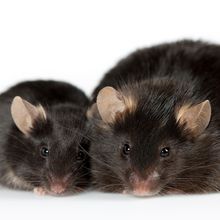immunity

The Evolution of Bats’ Super Immunity
Niki Spahich, PhD | Jan 10, 2024 | 4 min read
Researchers generated complete genomes of two important bat species and explored their immune- and cancer-related genes.

Aging Dogs Provide Insights for Human Longevity
Hannah Thomasy, PhD, Drug Discovery News | Jul 19, 2023 | 6 min read
Biogerontologist Matt Kaeberlein studies aging pets to determine how to improve healthspan in dogs and their humans.

Molecular Glue ‘Shreds’ Cas9 and Enables a New Form of CRISPR Control
Ida Emilie Steinmark, PhD | Apr 26, 2023 | 3 min read
In a bid to address safety concerns about immune reactions during treatment with CRISPR-based therapeutics, a new technique speeds up how quickly the body destroys the DNA-cutting enzyme Cas9.

Targeting Antigen “Sanctuary” in Lymph Nodes Could Make Vaccines Better
Natalia Mesa, PhD | Feb 10, 2023 | 3 min read
Researchers find that small sacks inside lymph nodes contain low proteolytic activity and act as safe havens for antigens.

Can We Predict How Well Someone Will Respond to a Vaccine?
Natalia Mesa, PhD | Nov 14, 2022 | 7 min read
Researchers find signatures pre- and post-vaccination that correlate with a more robust immune response.

Obesity Protects Against Genital Herpes in Mice, Study Finds
Katherine Irving | Nov 11, 2022 | 3 min read
A high-fat diet induced changes to the animals’ vaginal microbiomes that boosted survival after exposure to the virus.

Flu/RSV Coinfection Produces Hybrid Virus that Evades Immune Defenses
Catherine Offord | Oct 25, 2022 | 2 min read
When fused to RSV, influenza A virus is better able to escape antibodies that usually neutralize it, an in vitro study finds.

Genes that Aided Black Death Survival Linked to Autoimmunity
Jef Akst | Oct 20, 2022 | 2 min read
A new study points to repercussions of the Medieval pandemic for the health of modern humans.

US Agency to Look into Project on Modified Coronavirus
Catherine Offord | Oct 18, 2022 | 3 min read
The National Institute of Allergy and Infectious Diseases was not aware that the work involved a chimeric strain of SARS-CoV-2, STAT reports.

T Cells Ward Off Aging with Help from Their Friends
Natalia Mesa, PhD | Sep 16, 2022 | 5 min read
Immune cells deliver packages of telomeres to T cells, helping them retain their virus-fighting function over time, research suggests.

Historic Adaptations May Now Make Us Susceptible to Disease
Dan Robitzski | Sep 16, 2022 | 5 min read
Researchers made the find using an algorithm that purportedly distinguishes between mutations that were selected for and those that came along for the ride by coincidence, a feat that has long eluded scientists.

Psychological Stress Distracts the Immune System from Fighting Infections
Jennifer Zieba, PhD | Aug 8, 2022 | 3 min read
Acute stress makes immune cells migrate immediately to the bone marrow, which prepares the body for injury at the expense of increasing infectious disease susceptibility.

How the Omicron Subvariant BA.5 Became a Master of Disguise—and What It Means for the Current COVID-19 Surge
Suresh V. Kuchipudi, The Conversation | Jul 26, 2022 | 4 min read
Several mechanisms contribute to the increased transmissibility of this SARS-CoV-2 variant.

Nasal Vaccines Are Commercially High Risk, Perhaps High Reward
Jef Akst | Jun 13, 2022 | 10+ min read
Dozens of intranasally delivered vaccines targeting SARS-CoV-2 are in development. Could they pave the way for widespread nasal vaccination in the future?

Science Snapshot: Eye Immunity
Lisa Winter | May 26, 2022 | 1 min read
Researchers find that tissue-resident memory T cells in the corneas of mice engender a lasting immune response.

Genetically Altered Mice Harness Benefits of Calorie Restriction
Sophie Fessl, PhD | Feb 11, 2022 | 4 min read
A study identifies a gene that appears to be partially responsible for the health effects of a limited diet.

Studies Identify Risk Factors for Long COVID
Natalia Mesa, PhD | Jan 26, 2022 | 4 min read
Two recent papers provide insight into possible risk factors for developing the chronic condition, including autoantibodies and diabetes.

Doubts Raised Over Whether Mice Can Truly Inherit Immunity
David Adam | Jan 26, 2022 | 3 min read
An independent lab fails to replicate results suggesting mammals exposed to pathogens could pass on immunological protections through epigenetic mechanisms.

Presidential Pox, 1863
Annie Melchor | Dec 1, 2021 | 3 min read
Researchers continue to debate whether US President Abraham Lincoln was coming down with smallpox as he delivered his famous Gettysburg Address, and if he had been immunized.
